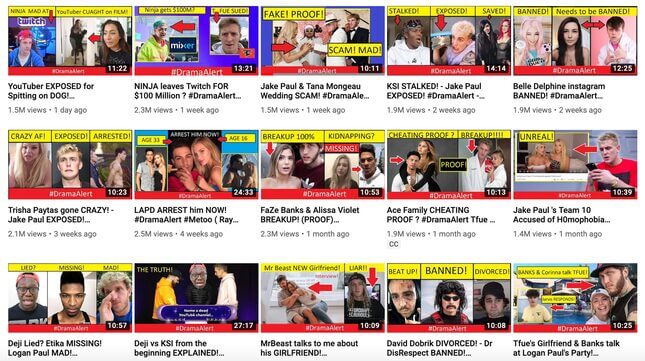The Insular, Gossip-Fueled World of YouTube Drama Channels
Latest
Last month, two YouTube celebrities, Tana Mongeau and Jake Paul, got “married” in an extremely messy ceremony that literally ended in a fist-fight. Court documents confirming their betrothal have yet to surface—and they won’t, as Mongeau has recently made clear the pair didn’t get married “on paper.” But there are plenty of clues to suggest that #Jana isn’t the classic love story of this modern digital age, from the guest list, which was built around clout-worthy ‘net celebs (and one Oprah impersonator), to invitations, which dubbing the wedding a “cloutrimony.”
It’s a mystery that normal gossip tabloids are ill-prepared to follow: Considering the popularity of YouTube prank videos, especially those where influencers deceive their loyal audiences by planning fake trips, faking a relationship or faking wealth, faking a wedding is just part of the YouTuber strategy—the blurry line between fact and fiction is part of the draw. (In fact, the fake wedding has been done before.)
They even have an appropriate name: drama channels.
Despite the hordes following the #JANA fiasco, the mainstream gossip media is still lacking in regular influencer coverage—save for the JustJared.com’s regular perusal. (As one of the few sites that focuses on young celebrities, it’s therefore required to keep an ear to the ground when it comes to YouTube.) Tana and Jake, some of the most ubiquitous vlog stars on the platform, rarely make headlines. So to get their fill of controversies and conspiracies, fans turn to new breed of niche YouTube news channels, dedicated to chronicling the minute-by-minute scandals drummed up by the generation of YouTuber reality stars, documenting their antics in real time. They even have an appropriate name: drama channels.
Drama channels—also called gossip channels or tea channels—are no new phenomenon, but they’re growing in number and increasing in popularity. As YouTube’s audience grows more robust, there are economic reasons for this: as The Atlantic reported in May, “many tea accounts are monetized, and Social Blade, a social-analytics platform, estimates that Tea Spill alone is earning up to $65,000 a month.” At a time where kids legitimately want to grow up to be YouTubers, hosting a drama channel is a way to both earn a lush income and gain notoriety in a burgeoning community. The career progression from YouTube drama host to Jake Paul feels a lot more linear than, say, vlogger to filmmaker.
-

-

-

-

-

-

-

-

-

-

-

-

-

-

-

-

-

-

-

-

-

-

-

-

-

-

-

-

-

-

-

-

-

-

-

-

-

-

-

-








































